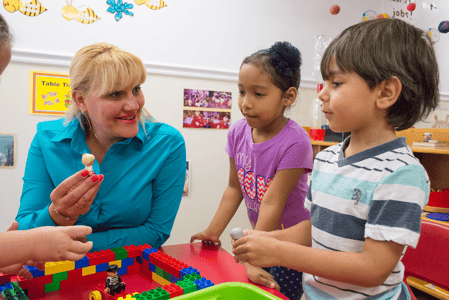
A recently published issue brief by the Learning Policy Institute examines exactly what it would take to create cooperative early childhood education (ECE) policy change in California. The issue brief presents recommendations to California policymakers on how to improve early childhood education for all children. These recommendations are based on a previous report: Understanding California’s Early Care and Education System.
The premise is that for California to provide all children with access to high-quality ECE, the state needs to turn its “current uncoordinated set of underfunded programs into a true system of supports for children, families, and providers.”
For this to happen, four proposed action goals need to be met:
- Build a coherent system of ECE administration
- Make ECE affordable for all children birth to age five
- Build a well-qualified workforce
- Improve the quality of all ECE programs.
While all four goals are critical to the long-term success of positive ECE policy change, we were especially excited that quality improvement was identified as a leading factor. We are even more thrilled that the brief specifically recommended that California expand CLASS® use in their QRIS system. Additionally, the issue brief specifically highlights the importance of supporting high-quality adult-child interactions through CLASS implementation. Although CLASS use in California’s QRIS is mandatory, participation in the QRIS itself is voluntary (currently only about 14% of Californian providers participate).
To improve the quality of all ECE programs, the brief recommends that California grow its QRIS by increasing provider access to state quality improvement funds, centralizing training for QRIS assessors, and investing in research to continuously improve the effectiveness of the QRIS. Long-term these changes would raise the quality requirements for lower-achieving programs, ensure all state-supported programs participate in quality improvement, and promote access to professional development for all ECE providers.
We are honored that the CLASS continues to be recognized by leading ECE researchers as both an effective measure, and a critical pathway to positive change in ECE policy. Although this brief was developed specifically for California, it draws upon previously successful interventions and policy change from states across the nation. It offers the opportunity for states to learn from one another and explore solutions to nationwide problems together. We look forward to seeing the hard work of our state partners and CLASS providers come to fruition!
For those interested in learning more, the full report can be found online.
Citation
Building an Early Learning System that Works: Next Steps for California (policy brief) by Hanna Melnick, Beth Meloy, Madelyn Gardner, Marjorie Wechsler, and Anna Maier is licensed under a Creative Commons Attribution-NonCommercial 4.0 International License

Emma Granowsky is a research and public policy intern at Teachstone this summer. She is a rising senior at Davidson College and is majoring in public health. She is interested in social disparities and the use of education policy as a form of primary health prevention. Last summer she taught reading to 3rd-5th graders through the Freedom School program sponsored by the Children’s Defense Fund.
